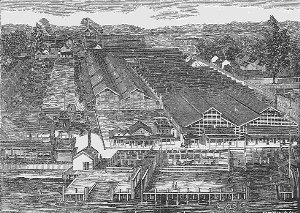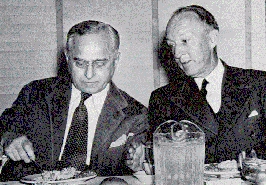 The Crescent City Slaughterhouse--its monopoly was challenged in the 1873 Slaughterhouse Cases Note
that there are several possible positions that
could be taken with respect to the incorporation
debate. First, one could argue that the
Fourteenth Amendment (either through the P & I
Clause or the Due Process Clause) made the
specific provisions of the Bill of Rights
enforceable against the states and no more.
This was the view argued for by Justice
Black. Second, one could argue that the
provisions of the Bill of Rights are essentially
irrelevant to interpretation of the Fourteenth
Amendment, and that violations of the Due Process
Clause are to be determined by a natural-law-like
tests such as "Does the state's action shock the
conscience?" or "Is the state's action
inconsistent with our concept of ordered liberty"?
This is the "No Incorporation" Theory advanced by
Justice Frankfurter, among others. Third,
one could take a position such as Justice White
did in Duncan that the Fourteenth
Amendment incorporates certain fundamental
provisions, but not other non-fundamental
provisions. This view is often called the
"Selective Incorporation" Theory. Finally,
one could adopt either a "Selective Incorporation
Plus" view or a "Total Incorporation Plus" (see
Justice Murphy's view in Adamson, for
example) view. These views hold that in
addition to incorporating some or all of the
provisions of the Bill of Rights, the Fourteenth
Amendment also prohibits certain other fundamental
rights from being abridged by the states. More
recently, the Court considered the incorporation
question in the 2010 case of McDonald v Chicago,
involving a challenge to Chicago's tough gun
control legislation. Just two years earlier,
the Court had ruled in a case challenging a
District of Columbia gun control regulation that
the 2nd Amendment guaranteed an individual right
to bear arms. In McDonald, by a 5 to 4 vote, the
Court held that the 2nd Amendment right was
thought by ratifiers of the 14the Amendment "among
those fundamental rights necessary to our system
of ordered liberty" and is therefore now a right
fully enforceable against the states.
Justice Thomas, concurring, argued that the better
vehicle for incorporation, one truer to the
original understanding of the 14th Amendment, was
the Privileges and Immunities Clause.
Dissenters argued that the right to bear arms,
"unlike other forms of substantive
liberty,...often put others' lives at risk" and
was therefore not the sort of liberty the 14th
Amendment protected against state enforcement. In
2019, The Court concluded, in Timbs v Indiana,
that the Excessive Fines provision of the 8th
Amendment was incorporated through the 14th
Amendment, and thus applicable to the
states. The following year, in Ramos v
Louisiana, the Court said the same thing
about the "unanimous verdict" requirement of the
6th Amendment, previously found (as a result of a
couple of 5 to 4 split decisions, with one justice
finding states not to be required to have
unanimous verdicts, but reaching a different
conclusion for the federal government) to be
applicable to the federal government, but not the
states.
|
Cases
The Bill of Rights
Incorporated or Not Incorporated? 2nd Amendment: Fully incorporated. 3rd Amendment: No Supreme Court decision; 2nd Circuit found to be incorporated. 4th Amendment: Fully incorporated. 5th Amendment: Incorporated except for clause guaranteeing criminal prosecution only on a grand jury indictment. 6th Amendment: Fully incorporated. 7th Amendment: Not incorporated. 8th Amendment: Fully Incorporated. Questions 2. What are the pragmatic reasons for favoring one or another theory relating to incorporation? 3. Even assuming that a specific provision of the Bill of Rights is "fundamental to the American scheme of justice," should we apply every decision marking the outer limits of the federal right to the states? 4. What evidence should we look to in determining whether a right is fundamental to the American scheme of justice? Whether history shows the right has always been respected? Whether history shows the right has been respected in recent times? Whether or not the vast majority of states have respected the right in question? What the framers and ratifiers of the Bill of Rights thought about the right? Whether or not we can imagine a fair system of justice without the right in question? 5. If the Fourteenth Amendment was intended to make the provisions of the Bill of Rights applicable to the states, it was the P & I Clause, not the Due Process Clause, that was meant to accomplish that. Is it too late for the Supreme Court to correct its error? 6. Assuming Justice Thomas in McDonald is correct--that the Privileges and Immunities Clause has more historical support for being the proper vehicle for incorporation--, should the P & I Clause have been the basis for incorporation in that case? 7. What do you think of the dissenters' argument in McDonald that the right to bear arms differs from all rights previously incorporated in that exercise of the right often results in physical harm to others, and therefore the Court should be reluctant to enforce such a right against the states? |


